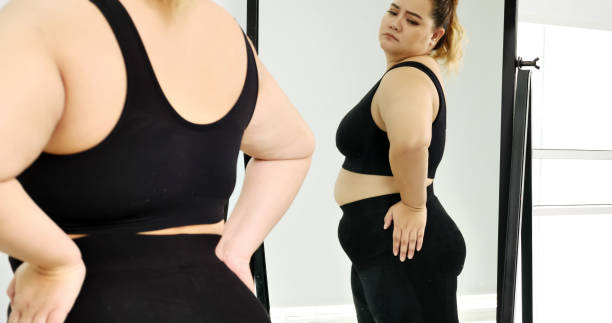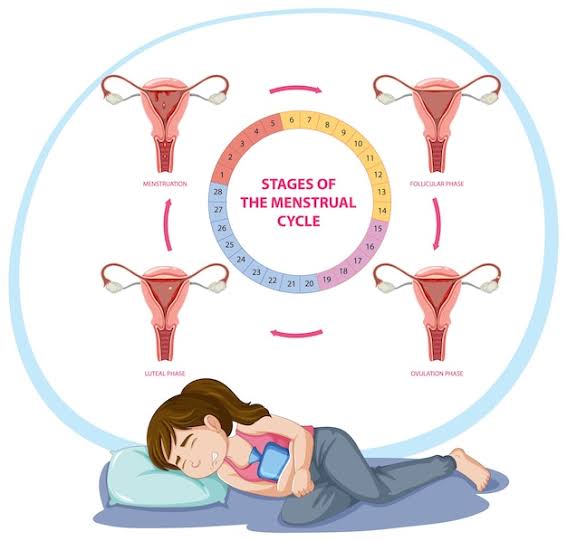Ladies, we’ve all been there. That time of the month when everything seems to go haywire – our emotions are all over the place, our energy levels are low, and let’s not forget the dreaded bloating. But there’s one thing that really gets to us: feeling like we look fat. It’s frustrating, it’s discouraging, and it can really mess with our self-esteem. But fear not, my fellow period warriors, because new scientific research suggests that this “fat feeling” might just be a trick of the mind. So let’s dive into the fascinating world of hormones, emotions, and why we perceive ourselves differently during that time of the month.

Contents
Why Do I Look Fat on My Period?
During your period, you might have experienced that dreaded feeling of looking fat. But don’t worry, you’re not alone. Many women go through this. So why does it happen? Let’s dive into the science behind it.
Hormones and Emotions
One of the main culprits behind feeling fat on your period is the fluctuation of hormones. These hormonal changes can lead to increased emotions and mood swings, which can affect your perception of your body. The heightened emotions can make you feel guilty about your eating habits, even if you haven’t actually gained any weight.
The Guilt Factor
Research suggests that the hormones released during your period can make you feel guilty about what you’re eating. This guilt can trigger feelings of self-consciousness and self-loathing, which can contribute to the perception of looking fat. It’s important to note that this guilt can occur even if you’re not actually gaining weight during your period.
Bloating vs. Weight Gain
While bloating is a common symptom of menstruation, it’s important to differentiate between bloating and actual weight gain. Bloating occurs due to water retention and can make you feel more full and uncomfortable. However, it doesn’t necessarily mean you’ve gained fat. Understanding this difference can help alleviate some of the negative feelings associated with looking fat on your period.
Navigating Through
Now that you know the science behind feeling fat on your period, it’s important to navigate through these challenging times with self-compassion. Remember, the perception of looking fat is influenced by hormones and emotions, and it doesn’t necessarily reflect your actual appearance. Be kind to yourself, practice self-care, and focus on maintaining a healthy mindset during this time.
So the next time you feel fat on your period, remember that it’s not just about the physical changes happening in your body. It’s a combination of hormones, emotions, and perception. Stay positive and embrace your body’s natural fluctuations. You’re beautiful just the way you are.
Understanding the Menstrual Cycle

The Phases of the Menstrual Cycle
The menstrual cycle is a complex process that occurs in every woman’s body. It is divided into four main phases:
- Menstruation: This is the phase when the lining of the uterus sheds, resulting in bleeding. It usually lasts for 3-7 days.
- Follicular Phase: Following menstruation, the body starts preparing for ovulation. The ovaries produce hormones that stimulate the growth of follicles, which contain eggs. This phase typically lasts for 7-10 days.
- Ovulation: This is the phase when a mature egg is released from the ovary. It usually occurs around day 14 of the menstrual cycle. Ovulation is a crucial period for fertility.
- Luteal Phase: After ovulation, the empty follicle turns into a structure called the corpus luteum, which produces hormones to prepare the uterus for potential pregnancy. If pregnancy doesn’t occur, the corpus luteum breaks down, leading to the start of a new menstrual cycle.
Hormonal Changes During the Menstrual Cycle
Hormones play a vital role in regulating the menstrual cycle and can have a significant impact on how you feel and perceive your body. Here are the key hormones involved:
- Estrogen: This hormone is responsible for the growth and development of the uterine lining during the follicular phase. It also contributes to feelings of well-being and can have a positive effect on body image.
- Progesterone: Progesterone levels rise after ovulation to prepare the body for pregnancy. It can cause fluid retention, leading to bloating and weight gain. This can contribute to the feeling of looking fat during your period.
- Gonadotropins: These hormones, including follicle-stimulating hormone (FSH) and luteinizing hormone (LH), are responsible for stimulating the ovaries and regulating the menstrual cycle. Fluctuations in gonadotropin levels can affect mood and body perception.
Understanding these hormonal changes can help you make sense of why you may feel bloated or perceive yourself as looking fat during your period. It’s important to remember that these feelings are temporary and influenced by the natural fluctuations in hormones. Practice self-compassion and focus on maintaining a healthy lifestyle rather than fixating on temporary changes in your body.
By understanding the menstrual cycle and the role hormones play, you can navigate through these challenging times with a better understanding of your body and emotions. Remember, it’s not just about how you look, but how you feel inside that truly matters.
Water Retention and Bloating
How Does Water Retention Occur?
During your period, it’s common to experience bloating and the feeling of looking fat. One of the main causes of this is water retention. Let’s take a closer look at how water retention occurs during this time.
Hormonal fluctuations: The rise and fall of hormones, particularly estrogen and progesterone, during your menstrual cycle can lead to water retention. These hormonal changes can cause your body to retain more water than usual, resulting in bloating and a feeling of being heavier.
Sodium intake: High sodium intake can also contribute to water retention. Many processed foods, such as chips, fast food, and canned soups, are often high in sodium. During your period, you may have cravings for these types of foods, which can increase your sodium intake and worsen bloating.
Dehydration: Ironically, not drinking enough water can also lead to water retention. When your body is dehydrated, it holds onto water as a survival mechanism. This can result in bloating and a feeling of looking fat.
Why Does Bloating Happen During Periods?
Bloating is a common symptom of menstruation, and it can make you feel self-conscious about your appearance. But why does bloating happen during periods? Let’s find out.
Hormonal changes: As mentioned earlier, hormonal fluctuations during your period can cause bloating. Estrogen and progesterone can affect the way your body processes and eliminates waste, leading to a buildup of gas and bloating.
Slower digestion: During your period, your body produces higher levels of the hormone progesterone. This hormone can slow down your digestive system, causing food to stay in your stomach and intestines for longer periods. This can result in bloating and discomfort.
Increased sensitivity: Hormonal changes during your period can also make your body more sensitive to certain foods. This can lead to bloating and digestive issues, even if you normally tolerate these foods well.
It’s important to remember that bloating and water retention are temporary and will subside as your period ends. Understanding the causes of bloating can help you navigate through these challenging times with more self-compassion and a better understanding of your body’s natural processes.
Increased Appetite and Food Cravings
Hormonal Influence on Appetite
During your period, hormonal fluctuations can have a significant impact on your appetite. The rise and fall of estrogen and progesterone levels can lead to increased hunger and cravings for certain types of food. These hormonal changes can make you feel like you have an insatiable appetite, causing you to eat more than usual.
Estrogen, in particular, plays a role in regulating appetite. It helps to increase the production of serotonin, a neurotransmitter that helps regulate mood and appetite. When estrogen levels drop before your period, it can lead to a decrease in serotonin levels, which can trigger feelings of hunger.
The Role of Cravings During Menstruation
Cravings during your period are not uncommon. Many women experience intense cravings for sweet, salty, or fatty foods. These cravings are often a result of hormonal changes and can be difficult to resist.
Progesterone, another hormone that fluctuates during your menstrual cycle, can influence your cravings. Increased levels of progesterone can lead to a decrease in blood sugar levels, which can trigger cravings for high-carbohydrate and sugary foods. These types of foods can provide a quick energy boost and temporarily improve mood.
It’s important to understand that cravings during your period are a normal part of the hormonal fluctuations that occur in your body. Giving in to these cravings occasionally is not a cause for concern. However, it’s essential to maintain a balanced diet and make healthy food choices as much as possible.
Remember, it’s natural to experience increased appetite and cravings during menstruation. Hormonal changes can influence your hunger levels and the types of food you crave. By understanding these influences, you can navigate through this time with more self-compassion and make informed choices about your diet.
Emotional Factors and Body Image
Impact of Hormones on Mood
During your period, hormonal changes can have a significant impact on your mood and emotions. Fluctuations in estrogen and progesterone levels can lead to increased feelings of irritability, sadness, or even anxiety. These hormonal changes can also affect your perception of your body.
When your hormones are out of balance, it’s common to experience heightened emotions, which can contribute to feelings of self-consciousness and self-loathing. This can make you more likely to perceive yourself as looking fat, even if there hasn’t been any actual weight gain.
Societal Pressure and Body Image
Societal pressure and the unrealistic beauty standards portrayed in the media can also play a role in how you perceive your body during your period. The constant exposure to images of perfectly toned bodies can create a distorted perception of what is considered “normal” or “ideal.”
Feeling fat on your period may be influenced by these societal pressures, as you may compare yourself to these unrealistic standards. It’s important to remember that every body is unique and that the changes you experience during your menstrual cycle are completely normal and natural.
Rather than comparing yourself to unrealistic ideals, focus on embracing your body and its natural fluctuations. Practice self-compassion and remind yourself that your worth is not determined by your appearance.
Remember, the perception of looking fat during your period is influenced by hormonal changes, emotions, and societal pressures. It’s important to prioritize your mental and emotional well-being during this time and avoid falling into the trap of negative self-talk.
Stay tuned for the next section, where we’ll explore the physical factors that can contribute to feeling bloated during your period.

Tips for Managing Period-Related Weight Gain
Eat a Balanced Diet
Maintaining a balanced diet is crucial during your period to help manage any weight gain. Focus on consuming nutrient-rich foods that provide you with the necessary vitamins and minerals your body needs. Here are a few tips to help you maintain a balanced diet:
- Incorporate plenty of fruits and vegetables into your meals to ensure you’re getting a variety of vitamins and minerals.
- Choose whole grains, such as brown rice and whole wheat bread, over refined grains, as they are higher in fiber and can help you feel fuller for longer.
- Include lean proteins, such as chicken, fish, and tofu, in your meals to help support muscle growth and repair.
- Opt for healthy fats, like avocados, nuts, and olive oil, which can help keep you satisfied and provide essential nutrients.
Stay Hydrated
Drinking enough water is essential for overall health, and it can also help manage period-related bloating and water retention. Here are a few tips to help you stay hydrated:
- Aim to drink at least 8 cups (64 ounces) of water per day.
- Carry a water bottle with you throughout the day to make it easier to stay hydrated.
- If you struggle to drink plain water, try infusing it with fruits or herbs for added flavor.
- Limit your intake of carbonated beverages and drinks high in sodium, as they can contribute to water retention.
Engage in Regular Exercise
Regular exercise is not only beneficial for your overall health but can also help manage weight gain during your period. Here are a few tips to help you stay active:
- Incorporate both cardiovascular exercises, like jogging or cycling, and strength training exercises, like weightlifting or bodyweight exercises, into your routine.
- Aim for at least 150 minutes of moderate-intensity aerobic activity per week, or 75 minutes of vigorous-intensity aerobic activity.
- Find activities that you enjoy and make it a priority to engage in them regularly.
- Don’t feel pressured to push yourself too hard. Listen to your body and adjust your exercise routine as needed.
Remember, managing period-related weight gain is all about taking care of your body and prioritizing your health. By maintaining a balanced diet, staying hydrated, and engaging in regular exercise, you can navigate through your period with more ease and confidence.
Conclusion
Understanding why you may feel like you look fat during your period can help you navigate through these challenging times with more self-compassion and a better understanding of your body. Hormonal changes during menstruation can lead to increased emotions and mood swings, which can affect your perception of your body. The guilt you may feel about your eating habits during this time can trigger feelings of self-consciousness and self-loathing, contributing to the perception of looking fat. However, it’s important to differentiate between bloating and actual weight gain, as bloating is a common symptom of menstruation due to water retention.
Remember that the perception of looking fat during your period is influenced by hormones, emotions, and societal pressures. Every body is unique, and the changes you experience during your menstrual cycle are completely normal and natural. Instead of comparing yourself to unrealistic ideals, focus on embracing your body and its natural fluctuations. Practice self-compassion and remind yourself that your worth is not determined by your appearance.
By maintaining a balanced diet, staying hydrated, and engaging in regular exercise, you can manage period-related weight gain and navigate through your period with more ease and confidence. Prioritize your mental and emotional well-being during this time and avoid falling into the trap of negative self-talk.
I am a medical student with experience and interest in Women’s health and well-being.